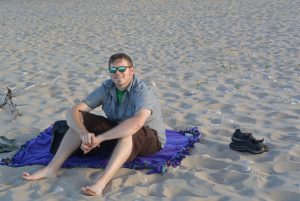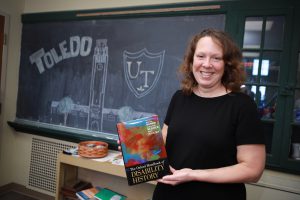Author Archive
Study Reveals Many Great Lakes State Parks Impacted By Record-High Water Levels
Tuesday, July 7th, 2020Every summer millions of people visit parks and protected areas along the shorelines of the Great Lakes to camp, hike, swim and explore nature’s beauty.
While COVID-19 has impacted staffing, operations and budgets at the parks, tourists this year also may notice changes if recent record-high water levels persist on Lake Huron, Lake Ontario, Lake Michigan, Lake Erie and Lake Superior.
A new study by a graduate student at The University of Toledo zeroes in on how coastal flooding and erosion in 2019 damaged park facilities and roads and interrupted visitor experiences, as well as examines the financial cost of the high water levels.

Eric Kostecky, UToledo graduate student earning his master’s degree in geography, at Sleeping Bear Dunes National Lakeshore
The research presented at the 2020 Great Lakes Virtual Conference, which is hosted by the International Association of Great Lakes Research, was completed by Eric Kostecky, a graduate student earning his master’s degree in geography, as part of a course in environmental planning he took last fall while completing his undergraduate degree in geography and planning.
“A humbling statistic is that 75% of the parks indicated that continued higher lake levels in 2020 and beyond would further impact park operations and infrastructure,” Kostecky said. “Future management actions would be to improve parking lots and roads and to move hiking trails, campgrounds and public access locations.”
To gather information, Kostecky surveyed 50 parks along the Great Lakes, both federal and state parks in the United States and provincial parks in Canada. Twenty-nine responded.
“Even though Great Lakes parks and protected areas have experienced impacts from shoreline erosion and flooding during previous high water-level events in 1972-73 and 1985-86, this study is the first comprehensive attempt to catalogue those impacts,” said Dr. Patrick Lawrence, professor and chair of the UToledo Department of Geography and Planning and Kostecky’s faculty advisor.

Golden Hill State Park
The study shows 50% of the responding parks were impacted by both shoreline erosion and flooding, with the most common type of damage being to boat launches and building structures that were flooded, and roads near dunes washed away by waves.
Total cost of damage for 55% of the parks was $50,000 or less.
As a result of the damage, parks implemented a variety of changes for public safety last year: sections of the park were closed, select park operations were canceled, and some visitor education programs were suspended.
Great Lakes water levels peaked in July 2019, with increases varying between 14 and 31 inches above their long-term averages; Lake Superior was at 14 inches above its average, while Lake Michigan, Lake Huron, Lake Erie and Lake Ontario were at 31 inches above average, Lawrence said.

Indiana Dunes National Park
“The water levels in the Great Lakes fluctuate, but they don’t fluctuate rapidly, so it’s hard to say if we’re still in the upswing or on the downswing,” Kostecky said. “We won’t know if we’re continuing to rise or if waters have started to recede for the next couple of years.”
The Great Lakes shoreline stretches 10,000 miles around eight U.S. states and Canada.
“Many parks and protected areas in the Great Lakes have struggled with the economic costs and interruptions of their operations, including services and programs for their visitors, and are concerned that as this period of high water levels continues this summer, they will face ongoing challenges in delivering the levels of public access and services to their visitors so eager to explore the parks and enjoy the nature and environment provided by these special spaces,” Lawrence said.
Second Diversity Plan to Build on Strategic Successes
Wednesday, July 1st, 2020The University of Toledo has developed its second diversity plan with engagement from more than 3,100 campus and community stakeholders to advance the progress made during the inaugural strategic diversity plan.
“Diversity, inclusion and equity are core values of our University infused into every action we take,” Dr. Willie McKether, vice president for diversity and inclusion and vice provost, said. “We are proud of the strategic ways we have strengthened the environment throughout UToledo campuses over the last three years, and we must continue our critical efforts.”
The Office of Diversity and Inclusion was established in 2016 with the development of UToledo’s first Strategic Diversity Plan, which expired at the end of 2019. The mission of the office is to ensure every member of the campus community feels included, respected and free from discrimination. It also works to promote a diverse and culturally aware environment that prepares students for success in today’s global world.
The goals in the updated plan, which has a timeline of 2020 to 2023, focus on leadership and accountability, education and awareness, recruitment and retention, and community engagement.
The goals are similar, but not exactly the same as the first diversity plan. For example, the new plan establishes supplier diversity as its own goal rather than it being part of the community goal as it was previously, McKether said.
This second plan also has a greater number of strategies focused specifically on the recruitment and retention of underrepresented minority students.
“Since 2016, we’ve added two key positions, one in enrollment management and one in the provost’s office, that focus specifically on these areas and reflect the University’s commitment to diversity, inclusion and equity,” McKether said.
Accomplishments during the first three-year diversity plan include:
- Increasing student, faculty and staff feelings of inclusiveness, according to a campus survey;
- Increasing the African-American student retention rate by 8 percentage points and the Hispanic student retention rate by 5.4 percentage points;
- Reducing the equity gap by 7 percentage points;
- Increasing the African-American six-year graduation rate by 6 percentage points and by 2 percentage points for Hispanic students;
- Expanding the Office of Diversity and Inclusion to include an office on Health Science Campus;
- Establishing diversity plans, committees and leaders in all colleges; and
- Implementing a Dialogues on Diversity initiative.
View the diversity plan on the Office of Diversity and Inclusion website.
UToledo College of Medicine and Life Sciences, TPS to Host Virtual Discussion July 1 About Navigating Social Injustice Amidst COVID-19
Tuesday, June 30th, 2020The University of Toledo College of Medicine and Life Sciences Office of Diversity and Inclusion and Toledo Public Schools Office of Equity, Diversity and Inclusion are holding a virtual roundtable titled “Navigating Social Injustices Amidst a Pandemic: Open Roundtable Discussion” from 5 to 6 p.m. Wednesday, July 1 on WebEx.
Register for and access the free, public event on the College of Medicine and Life Sciences website.
 “This is an opportunity for members of the College of Medicine and Life Sciences to engage with the community and show support for Toledo Public Schools, students and parents. This aligns with our mission to serve the needs of our community outside the walls of our institution,” said Dr. Kimberly Jenkins, associate dean of diversity and inclusion in the UToledo College of Medicine and Life Sciences, and a moderator of the event.
“This is an opportunity for members of the College of Medicine and Life Sciences to engage with the community and show support for Toledo Public Schools, students and parents. This aligns with our mission to serve the needs of our community outside the walls of our institution,” said Dr. Kimberly Jenkins, associate dean of diversity and inclusion in the UToledo College of Medicine and Life Sciences, and a moderator of the event.
“We aim to continue the dialogue surrounding social injustice and the protests related to recent police killings, as well as discuss meaningful ways to support our young people in coping with these crises. Dealing with the tragic events of this year in the midst of a pandemic has been especially traumatic. Through this event and upcoming collaborations, we hope to strengthen our support for Toledo-area youth and their families and assure them they won’t face these challenges alone.”
Panelists include:
- Bro. Washington Muhammad, co-founder of the Community Solidarity Response Network;
- Dr. Darren Gordon, UToledo M.D./Ph.D. candidate and former national speaker of the house for the Student National Medical Association; and
- Ashley Futrell, attorney and community advocate.
Moderators include Jenkins, Dr. Treva Jeffries, assistant transformational leader of equity, diversity and inclusion at Toledo Public Schools, and Dr. Hope Bland, administrator in the Office of Equity, Diversity and Inclusion at Toledo Public Schools.
“The objective of this event is to provide support to our students and staff around the current social unrest while coping with the ongoing pandemic,” Jeffries said. “By including panelists from various fields, a wealth of knowledge will be gained in preparation for a successful transition into the new school year. I am confident that the panelists will provide valuable insight as to how participants can effectively work to eradicate racism in their own space.”
The UToledo College of Medicine and Life Sciences has a dedicated partnership with Toledo Public Schools, including pipeline programs that provide mentoring, bring students on campus, give them support and tools for success on college admissions and academic and professional development.
Disability History Scholar’s New Book Tells Forgotten Story of ‘Money, Marriage, and Madness’
Monday, June 29th, 2020A new book by a disability history scholar and Helen Keller expert at The University of Toledo tells the story of a white female physician – for some time, the only female doctor in Madison, Wisc. – and how the affluent woman came to spend 20 years in a state insane asylum as a patient of one of her former male colleagues.
Dr. Kim Nielsen, UToledo professor of disability studies, history and women’s and gender studies, wrote the biography published by University of Illinois Press about Dr. Anna Ott, who died in 1893 after being determined legally incompetent and institutionalized. Through Ott’s story, Nielsen spotlights how power, society, sexism and ableism built structures and social systems that favored the nondisabled in 19th century America.
 “Money, Marriage, and Madness: The Life of Anna Ott” describes how the legal and medical cultures shaped one woman.
“Money, Marriage, and Madness: The Life of Anna Ott” describes how the legal and medical cultures shaped one woman.
“Anna Ott had enjoyed status and financial success first as a physician’s wife and then as the only female doctor in Madison,” Nielsen said. “Throughout her first marriage, attempts to divorce her abusive second husband, and 20 years of institutionalization, Ott determinedly shaped her own life.”
Nielsen writes that historical and institutional structures, like Ott’s whiteness and laws that liberalized divorce and women’s ability to control their property, opened up uncommon possibilities for Ott. Other structures, from domestic violence in the home to rampant sexism and ableism outside of it, remained a part of even affluent women’s lives.
“I want readers to know that diagnoses have histories, and that they are not ahistorical,” Nielsen said. “Physicians, her husband and community leaders diagnosed Anna Ott as insane. This stigmatized and delegitimizing diagnosis reflected and reinforced the ideologies, assumptions, social structures and power dynamics of her time period. For folks invested in considering medical diagnoses all-knowing and ahistorical, this is difficult.”
While researching and writing the book, Nielsen was most surprised to discover the allegation that Ott robbed the local Wells Fargo bank.
Ms. Magazine included the book on its list of “June 2020 Reads for the Rest of Us.”

Dr. Kim Nielsen, UToledo professor of disability studies, history and women’s and gender studies
Nielsen is an editor and contributor to “The Oxford Handbook of Disability History” published by Oxford University Press in 2018. Nielson’s book, “A Disability History of the United States,” was published by Beacon Press in 2012.
Other books include “Beyond the Miracle Worker: The Remarkable Life of Anne Sullivan Macy and Her Extraordinary Friendship with Helen Keller” published by Beacon Press in 2009; “Helen
Keller: Selected Writings” published by New York University Press in 2005; “The Radical Lives of Helen Keller” published by New York University Press in 2004; and “Un-American Womanhood: Anti-Radicalism, Anti-Feminism, and the First Red Scare” published by Ohio State University Press in 2001.
UToledo to Host Virtual Roundtable Discussion June 25 After Death of George Floy
Thursday, June 18th, 2020As protests continue and calls for defunding police sound across the country, The University of Toledo is hosting its second campus conversation about the death of George Floyd.
The Dialogues on Diversity Virtual Townhall series continues at 5:30 p.m. Thursday, June 25 with “The Death of George Floyd: Where Do We Go From Here?” hosted jointly by the Office of Diversity and Inclusion and the Africana Studies program.
The free, public event can be accessed on WebEx using the access code 160 482 0630. The meeting password is maP4hKYQM32. Join by phone at 415.655.0002.
“Now that Mr. Floyd has been laid to rest, the protests are still strong and will continue, but we know they too will eventually fade from public consumption with the next big news cycle, and the anticipation of the murder trial of the four officers in a few months, what’s next,” said Angela Siner, director of the Africana Studies program and moderator of the virtual townhall. “The year 2020 has been unprecedented with the COVID-19 pandemic, the murder of George Floyd and subsequent civil protests. These issues must be addressed individually and collectively for us and the nation to heal and move forward.”
Participants also include:
- Dr. Shirley Green, UToledo adjunct professor of history and director of the Toledo Police Museum;
- Dr. Shingi Mavima, UToledo assistant professor of history;
- Dr. Michael Stauch, UToledo assistant professor of history;
- Dr. Dale Snauwaert, UToledo professor of social and philosophical foundations of education and peace studies, and co-coordinator of the peace studies minor in the Judith Herb College of Education; and
- Dr. Willie McKether, vice president for diversity and inclusion.
The University of Toledo is a community that celebrates and respects people of all backgrounds and experiences. As an institution, we remain committed to building an inclusive environment free of racism, sexism, bigotry and other negative influences.
UToledo to compete in new Esports Collegiate Conference
Wednesday, June 10th, 2020Gamers, get ready.
The University of Toledo is one of the founding members of the Esports Collegiate Conference, which begins gaming competitions in the fall semester.
UToledo students will go through tryouts to join the varsity esports team, which will practice several times a week and compete against other universities in the Mid-American Conference (MAC).
 The MAC announced June 10 the new Esports Conference that will feature fall and spring seasons with teams from UToledo, University of Akron, Ball State University, Bowling Green State University, University at Buffalo, Central Michigan University, Eastern Michigan University, Kent State University, Miami University, Northern Illinois University, Ohio University and Western Michigan University.
The MAC announced June 10 the new Esports Conference that will feature fall and spring seasons with teams from UToledo, University of Akron, Ball State University, Bowling Green State University, University at Buffalo, Central Michigan University, Eastern Michigan University, Kent State University, Miami University, Northern Illinois University, Ohio University and Western Michigan University.
“We are excited to be part of a historic opportunity for our students that facilitates high-quality gaming competition against MAC universities,” Tony North Jr., assistant director of programs and leadership development in the UToledo Office of Recreational Services, said. “We’re looking for high-character individuals with skills necessary to compete at a high level for esports, such as good hand eye coordination, fast reaction time, good reflexes, sound decision-making skills and good communication.”
The Esports Collegiate Conference will provide structure, scheduling and championship opportunities for its membership, with competition beginning in the 2020-21 academic year. The conference is an independent entity and will operate separately from the MAC.
An Esports Collegiate Champion will be crowned in each game title with the champion earning an automatic bid to the national postseason tournament.
Titles being considered for fall 2020 are Rocket League, Fortnite, Super Smash Brothers, Madden or FIFA. Spring season competition will be in Overwatch and League of Legends.
“The creation of Esports Collegiate represents the foresight of our presidents to establish a stand-alone competitive framework for collegiate esports competitors and enthusiasts,” MAC Commissioner Dr. Jon Steinbrecher said.
The number of players on a team depends on a game title.
“Each game title is essentially a different sport that requires a different roster size,” North said. “In the spring, League of Legends will require a minimum of five players, as well as two or three subs, and Overwatch requires a minimum of six players, as well as two or three subs.”
Students will have the opportunity to compete from their residence hall, home or a team location on campus.
“The nice things about esports is that you don’t have to be in a specific location to compete,” North said. “Students will have the ability to compete from wherever they are. However, we’re working to finalize a temporary esports location on campus to host practices and competitions.”
Information and criteria for UToledo tryouts will be announced when finalized.
Visit esports-collegiate.com for more information about the new conference.
UToledo Board of Trustees to Move Forward with Candidate Interviews for Interim President
Tuesday, June 9th, 2020Toledo, Ohio – The University of Toledo’s Board of Trustees has announced the finalists it is considering for the position of interim president. During the June 8 Special Meeting, the Board unanimously voted to interview three candidates for the interim leadership appointment.
The Board contracted with AGB Search which specializes in executive leadership searches exclusively for higher education. The firm’s managing principal, and former president of Ohio University and UToledo alumnus, Dr. Roderick McDavis, led the search bringing forward potential candidates for the Board’s review.
“I believe I speak on behalf of the entire Board when I say that we are extremely pleased with the caliber of candidates AGB has brought forward for consideration,” UToledo Board of Trustees Chair Mary Ellen Pisanelli said. “These candidates’ interest in the leadership position is a testament to the national reputation of our outstanding faculty and The University of Toledo.”
Following a brief discussion about the priorities for a transitional leader, the Board voted to interview three candidates:
- Dr. Christopher Colenda – President emeritus at West Virginia University (WVU) Health System and former chancellor for health sciences at WVU. During his tenure, the WVU Health System grew to include eight owned or affiliated hospitals throughout the state of West Virginia. Among his many academic leadership appointments, Colenda also served as vice president for clinical affairs and dean of the College of Medicine at Texas A&M University. He holds an M.D. from the Medical College of Virginia of Virginia Commonwealth University, a M.P.H. from Johns Hopkins University and a bachelor’s degree in chemistry from Wittenberg University. He completed residencies in pathology at Case Western University, behavioral medicine and psychiatry at University of Virginia and general preventive medicine at Johns Hopkins University. He was also the chief resident in the Department of Psychiatry and completed a fellowship in public mental health, both at Emory University.
- Dr. Gregory Postel – Former interim president and former executive vice president for health affairs at the University of Louisville (UofL) and current senior client partner representing healthcare services and higher education at Korn Ferry, an organizational consulting firm. Postel has extensive experience with academic medical center and university operations. He also served as CEO of UofL Physicians. As interim president he led the successful removal of UofL’s accreditation probation with the Southern Association of Colleges and Schools Commission on Colleges (SACS-COC) and restructured the UofL athletics department. He led the UofL’s budget reset necessitated by a $50 million shortfall. Among his many administrative accomplishments, Postel designed and implemented two academic affiliations including an eight-year, $33 million per year pediatric affiliation with Norton Healthcare and a $23 million a year adult affiliation agreement with KentuckyOne Health. A graduate of the College of Wooster with a bachelor’s degree in chemistry and an M.D. from Case Western Reserve University School of Medicine, he completed a residency in radiology at the Cleveland Clinic Foundation and a fellowship in neuroradiology at the Mayo Clinic Foundation.
- Dr. Chuck Staben – The former president and current professor of biology at the University of Idaho (U of I). Under his leadership U of I grew research more than 25%, increased student retention and graduation and doubled fundraising exceeding $50 million annually. His administrative experience also includes provost and vice president for academic affairs at the University of South Dakota and vice president for research at the University of Kentucky. He earned his Ph.D. in biochemistry at the University of California, Berkeley and his undergraduate degree in biochemistry at the University of Illinois, Champaign-Urbana. He also completed post-doc training at Stanford University and Chiron Research Laboratories.
The University is expected to launch a national search for the next president in the fall.
Special Board of Trustees Meeting June 8
Friday, June 5th, 2020Due to the COVID-19 pandemic, the UToledo Board of Trustees will conduct its meetings remotely.
Monday, June 8, 2020
4 p.m. Special Board of Trustees Meeting
Join via WebEx:
Meeting number (access code): 160 379 7388
Meeting password: zZDU2ksv6p3
Join via Phone:
+1-415-655-0002
Meeting number (access code): 160 379 7388
The Board of Trustees will immediately enter Executive Session upon convening the meeting to discuss the employment and compensation of a public employee.
Any questions may be directed to the Office of University Marketing and Communications by calling 312.805.3001 or via email to christine.billau@utoledo.edu.
UToledo to host virtual roundtable discussion June 4 about death of George Floyd
Tuesday, June 2nd, 2020The University of Toledo is hosting a campus conversation about the death of George Floyd at 5:30 p.m. Thursday, June 4.
The free, public event titled “Dialogues on Diversity Virtual Townhall” can be accessed on WebEx using the access code 160 282 6992. The meeting password is HSfu4PQF6D3. Join by phone at 415.655.0002.
Participants include:
- UToledo Police Chief Jeff Newton;
- Benjamin Davis, UToledo law professor;
- Dr. Monita Mungo, UToledo assistant professor of sociology;
- Dr. La Tasha Sullivan, director of the University Counseling Center;
- Nyah Kidd, president of the Black Student Union;
- Darren Gordon, former president of the UToledo chapter of the Student National Medical Association;
- Giselle Zelaya, president of the Latino Student Union;
- Nick Thompson, president of Student Government;
- Anjali Phadke, vice president of Student Government; and
- Asher Sovereign with the Sexuality and Gender Alliance.
“The events of the past week have brought to light the critical role higher education can and must play in facilitating open and honest discussions that empower us as a community and a nation to translate our ideals into actionable change,” Dr. Willie McKether, vice president for diversity and inclusion, said.
The University of Toledo is a community that celebrates and respects people of all backgrounds and experiences. As an institution, we remain committed to building an inclusive environment free of racism, sexism, bigotry and other negative influences.
UToledo to host virtual roundtable June 4
Saturday, May 30th, 2020The University of Toledo is a community that celebrates and respects people of all backgrounds and experiences. As an institution, we remain committed to building an inclusive environment free of racism, sexism, bigotry and other negative influences.
The events of the past week have brought to light the critical role higher education can and must play in facilitating open and honest discussions that empower us as a community and a nation to translate our ideals into actionable change.
As such, UToledo will be hosting a virtual roundtable on Thursday, June 4 at 5:30 p.m. It is through this open dialogue that we can move forward, together, and breathe.
Access information will be released next week.

